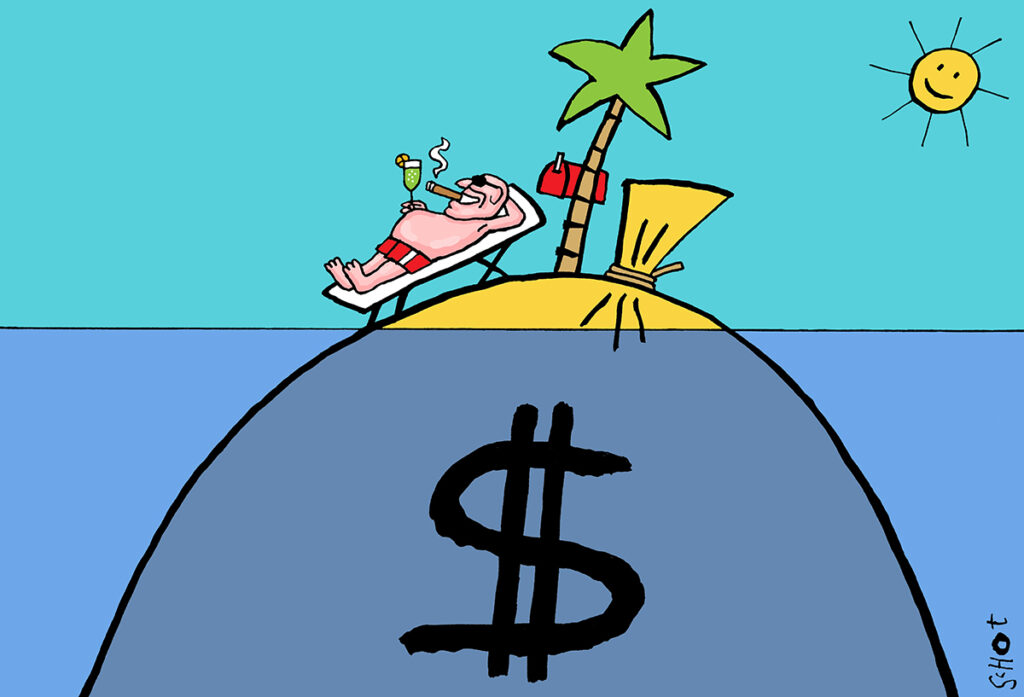Tax avoidance will be a piece of cake for multinationals again, thanks to Donald Trump
Large corporations must also pay taxes, according to an increasing number of governments. However, the approach to combating tax evasion is under pressure due to Donald Trump’s return to the White House.

What do you mean, paying taxes? From Dutch mailbox companies of the Rolling Stones and U2 to the centuries-old Swiss banking secrecy. Companies do everything they can to pay as little tax as possible and prefer to channel their money away through dubious constructions in the Cayman Islands, Guernsey, or Monaco.
This tax evasion seemed to come to an end due to better cooperation between countries worldwide. New legislation was also introduced at the European level. For example, the European Parliament called the tax haven of the Netherlands to order.
Because tax avoidance was not only the monopoly of shay banana republics in exotic places, our country also eagerly benefited from millions that Mick Jagger and Bono sang together. On paper, those bands were based in the Netherlands, because the profit on royalties was not or hardly taxed here.
Many countries, including the Netherlands, made a case for a minimum rate. But since Donald Trump has returned to power in the United States, the race-to-the-bottom for profit tax seems to have started again.
Not waterproof
While the net closed in on companies that manage to avoid or evade their profit tax, Donald Trump’s new administration wants to leave the agreement concluded for this purpose. According to the White House, the agreements are bad for American competitiveness.
‘And that while America, for example, took the lead in abolishing Swiss banking secrecy,’ says Arjan Lejour, professor of taxation and public finance at Tilburg University. ‘The Americans wanted more insight into all kinds of dubious financial money flows. They used their economic weight to put pressure on the Swiss, and with success.’
Tax havens
Worldwide, more countries joined the agreement to levy a minimum of fifteen percent tax on the profits of companies. Countries agreed to tackle tax evasion by exchanging data among themselves, according to Arjan Lejour and co-author Dirk Schindler of Erasmus University.
In their latest book Research Handbook on the Economics of Tax Havens, which was edited by them, they show that international policy against tax avoidance is successful. For example, since 2016, the Netherlands has automatically exchanged financial data with more than a hundred countries to prevent tax evasion.
An elephant in a china shop
But now Donald Trump is changing course and meeting the lobby of American multinationals, which have found in Trump a loyal ally against higher tax rates. ‘The American president even wants to go so far as to punish countries that start taxing profits of American multinationals again,’ says Lejour, ‘and that could be the death knell for the hard-won tax agreement.’
In this area too, Trump is going through the china shop like an elephant and leaving governments and economists worldwide in despair. On the one hand, it means that companies have fewer costs, but the uncertainty in the economic field is very high due to Trump’s policy, Lejour thinks. ‘That means that companies are waiting to invest, and that actually increases the chance of a recession.’
The benefits
The consequences of the American withdrawal are still unclear. Lejour: ‘I wonder whether Europe can keep that agreement alive on its own, I am a bit skeptical about it.’ In addition, the trade war has put Europe under great pressure to remain globally competitive. A higher profit tax is then less favorable.
Nevertheless, it remains important that there is an agreement, Lejour believes. After all, a government needs money for public tasks. If companies do not pay taxes, the bill ends up with citizens. While the business community is also reaping the benefits. Lejour: ‘Companies benefit from all the infrastructure that a government builds, and from all the laws that the government implements.’






